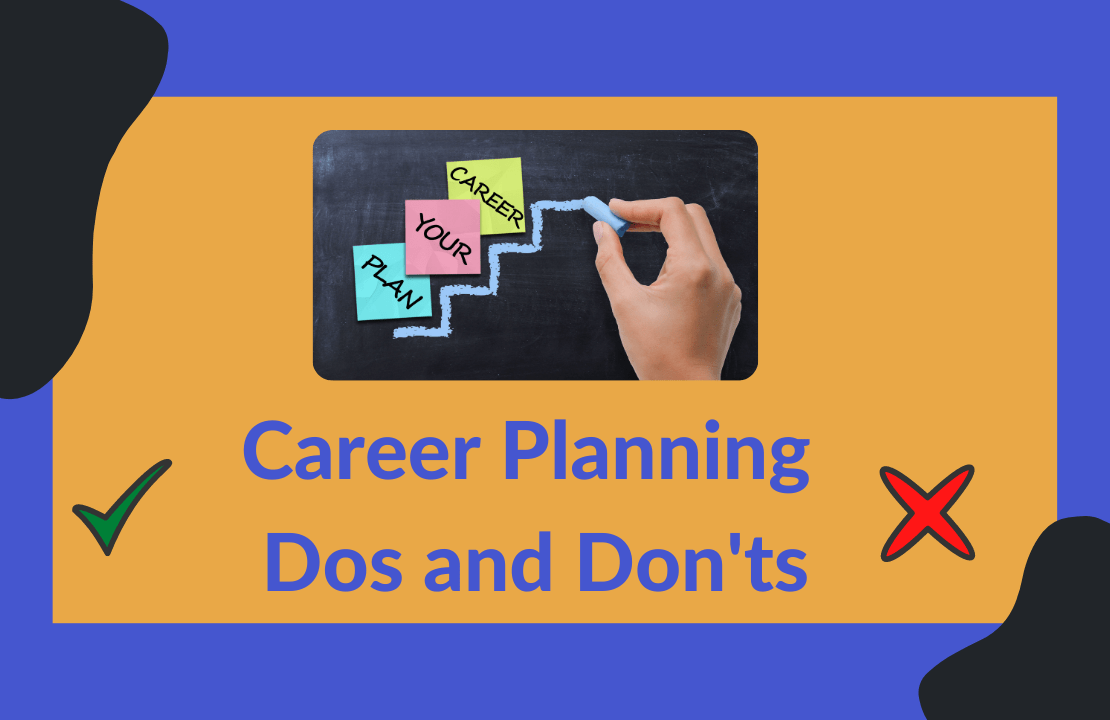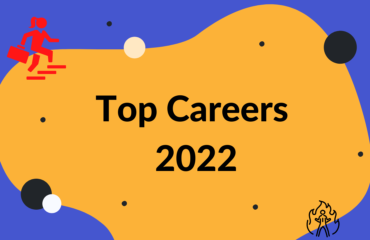Table of Contents
A successful and fulfilling career does not happen by chance. In order for you to build one, you need to take the time to reflect on what you want and plan how you will get there. Doing so would allow you to manage the direction of your career, the job skills and knowledge you will need, and how you can get them.
Your odds of achieving your career goals improve when you create a plan. However, not all career plans are created equal. In order for it to be effective, it needs to include clearly defined steps and then act on them. In this article, we have gathered career planning dos and don’ts to help you get started.
The Dos
1) Do a self-assessment
Personal self-assessment is an essential starting point for career planning. It allows you to make informed choices based on who you are, what you value, and what you have to offer to employers. Reflecting on your interests, skills, and values often yield important clues to finding meaningful opportunities that are a great match. Additionally, it makes it easier for you to communicate what you have to offer, which is critical to a successful job search.
For some professionals, figuring out their strengths and interests on their own can be challenging. If you’re one of them, you can leverage career assessment tools to guide your career planning. Some of the tools you can use include iSeek “Clusters”, MyNextMove, and MAPP Test. Getting a perspective and career support from a professional can also help you get more clarity.
2) Take time to do career research
Identifying a career that will make you feel fulfilled requires careful research. At first glance, many careers seem exciting or fun. But you could still end up feeling unfulfilled in these roles. Conducting comprehensive career research can help you weigh the factors and options to make an informed decision. Here are some key points to consider.
- Do the requirements, job duties, and work environment match your personality and skills?
- Do work hours, location, job outlook, and future advancement opportunities make the job worth pursuing?
- What are the skills, work experience, and type of degree required?
3) Create an action plan
Career planning can help you manage the direction of your professional path. However, a plan without action is just a dream. Unless you’re a magician, you cannot go from point A to point B just by planning alone. To turn your plans into a reality, you need to have clearly defined actionable steps. This will allow you to create a clear path to success, making it easier for you to realize your goals. Here are some tips for creating an effective action plan.
- Divide your main goal into smaller objectives to make it less overwhelming and intimidating.
- List areas you need to work on to boost your knowledge, skills, and experience.
- Set a timeline for completing each step in the process.
- Monitor your progress.
4) Establish a unique personal brand
Building a unique personal brand increases your chances of standing out from the competition, which is beneficial in your job search. One of the most effective ways to do this is through personal content marketing using professional social media platforms like LinkedIn. Apart from having a complete profile, we highly recommend showcasing your skills and expertise by creating and sharing relevant content. Doing so can help establish your reputation as an expert in your field. Let us give you some tips.
- Post at least one to two times per week to maintain consistency and relevance.
- Ensure that your content is relevant to your industry, experience, and skills.
- Make your posts as concise as possible, as this is known to yield a better engagement rate.
- Use hashtags to make your posts more discoverable.
5) Make connections
While the majority of your success depends on planning and actions, a part of it is determined by your connections. When done effectively, making connections through networking can speed up your job search process and give you a competitive advantage. Here’s why.
- It empowers you to find the right job that best matches your career goals.
- It enables you to obtain valuable career advice from people with expertise in your target industry or company.
- It can be a powerful resource for hidden opportunities.
- It can help build your reputation as being knowledgeable, reliable, and supportive.
- It is a great opportunity to exchange best practice knowledge and stay abreast of the latest trends in your target industry or company.
There are several ways you can make connections. One is by using digital channels like social media and networking apps. You may also network offline through various events, such as alumni events, company events, and local meetups. As a rule of thumb, create connections based on your career goals. Some good examples of people you can connect with include recruiters, industry experts, and business leaders.
6) Be positive and never give up
There is no such thing as a sure formula for success. Even with the best career planning, things may still not go as planned. You may encounter different obstacles that will test your perseverance and will to achieve your goals. When you experience failure along the way and feel like giving up, take Thomas Edison’s advice to heart. “The most certain way to succeed is always to try just one more time.”
For most professionals, enthusiasm and motivation can be challenging to sustain. But the good news is there are solutions that can help. Let’s take a look at some of the ways to stay positive even during the toughest career change.
- Figure out your why. Think of the long-term goals and keep this motivation in mind.
- Set a routine for your job search. Break each task into specific time periods.
- Read motivational career quotes when you need a bit of inspiration.
- Consider talking to a trusted friend, mentor, or career expert to gain a different perspective.
The Don’ts
1) Don’t set unrealistic career goals
Many professionals tend to make assumptions about careers and end up disappointed when the reality of the job does not meet their expectations. As a result, they get stuck in a job they don’t enjoy doing and feel demotivated. To prevent this from happening, don’t set unrealistic career goals.
How you set your career goals plays a significant role in achieving them and making progress. In fact, a study showed that one big factor in healthy goal setting is choosing attainable and realistic goals. One of the most effective ways to do this is by being SMART. Here’s what we mean.
- S – Set specific and concrete goals.
- M – Your goals should be measurable.
- A – Make sure your goals are achievable so you have a realistic chance of accomplishing them.
- R – Consider your interests, skills, and values to ensure your goals are relevant.
- T – Commit your goals to a realistic timeframe to keep you motivated to stay on track.
2) Don’t use a generic resume
To make your career plans a reality, you would typically need a resume to apply for your dream job. In some ways, creating a generic one and then sending it to every employer can save time. While a one size fits all approach may seem efficient, it doesn’t make you stand out. Instead, employers may get an impression that you are simply “shooting blindfolded”, hoping you will still hit the bullseye. In such a case, we all know you are more likely to miss your target. In the same way, you will have fewer chances of landing your dream job when using a generic approach.
Like what we always recommend, creating a tailored resume is key to the realization of your career plans. But this does not mean you need to act like a busy bee spending an entire day on every application. Be strategic. As they say, work smart, not hard. Below are some tips and tricks on how you can do this.
- Create a master resume that can easily be edited for each application.
- Use resume optimization tools like Jobscan to optimize your resume for Applicant Tracking Systems (ATS).
- Don’t do a “the more applications, the merrier” approach. Only apply for jobs that genuinely interest you.
3) Don’t skip the cover letter
Some employers may not require applicants to submit a cover letter. While this can be a good excuse for you to skip it, you shouldn’t. According to research, 53% of employers favor a candidate who submits a cover letter. So, make sure to include cover letter creation in your career planning to-do list.
An effective cover letter goes beyond reiterating what’s already in your resume. Rather, it should include professional storytelling that takes the employer on a journey through some of your key achievements and how you’ve put your skills to use. We recommend creating a master cover letter that you can easily tweak and tailor for each application.
4) Don’t come underprepared for an interview
Interviews can feel like you’re under a big spotlight, waiting to be scrutinized and judged. This can be nerve-wracking, especially if you’ve come unprepared. So, to help tame those pesky nerves, including interview preparation in your career planning must-dos is imperative. As they say, proper preparation prevents poor performance. Follow some of our tips below.
- Prepare for some of the most standard interview questions that you may encounter. Some examples include “Why did you apply for this job?” or “What are your biggest strengths and weaknesses?”
- Scroll through your target company’s website and social media to learn more about them as well as their services and culture.
- Practice before the actual interview.
5) Don’t accept a job offer on the spot
Receiving an offer after a challenging job search is a thrilling experience. You would want to jump for joy and say yes on the spot. But you need to resist that urge. Remember that the decision you will make is critical to the realization of your career plans. So, it would be sensible to take your time and carefully evaluate the job offer. If it is not aligned with your career goals and needs, be prepared to negotiate or walk away.
6) Don’t be afraid to ask for support
As you plan for a career change, you will experience challenges along the way. In such a case, having support on your side can help you stay optimistic and motivated throughout your journey. Don’t be afraid to ask for support from your family members, trusted friends, or even a career coach. These people can be your job search motivators when you need a little push. Additionally, they can also provide a different perspective that could be beneficial for your career planning.
Career planning can serve as a compass. It is a great tool for finding direction in your career. With an end goal in mind, you’ll be able to determine what actions you need to take to get there. While a career plan is essential, it does not have to be set in stone. Make it a habit to review and update it on a regular basis to ensure they match your goals. Lastly, always keep our career planning dos and don’ts in mind, and you’ll be set to achieve great results.











